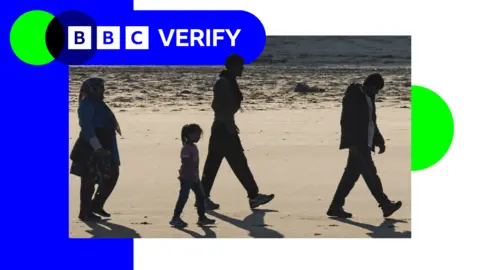Why do Channel migrants want to come to the UK?
 Getty Images
Getty ImagesPrime Minister Sir Keir Starmer and French President Emmanuel Macron have agreed that "new and innovative solutions" are needed to tackle small boat crossings.
The UK is paying France hundreds of millions of pounds to stop the boats leaving the French coast but, so far this year, the numbers of migrants arriving in the UK this way - most of whom go on to claim asylum - have reached record levels.
France has claimed that one factor attracting them is the ability to "work without papers" in the UK economy.
BBC Verify looks at the evidence for this and other "pull factors" cited as reasons for asylum seekers to choose the UK as a destination.
The informal economy?
The French government has argued that asylum seekers come to the UK because they believe they will be able to work in its informal economy - where tax is not paid and people are employed without legal status and proper documentation.
Estimating the size of the informal economy is not simple for obvious reasons.
Nevertheless, one recent study from researchers at the European Parliament, suggests the size of the UK's was about 11% of the total economy in 2022.
This was actually lower than their estimate for France's at 14% and lower than the average of 31 European countries at 17%.
By its nature the UK's informal economy provides potential opportunities for asylum seekers - and other irregular migrants - to work illegally - and the UK government has accepted the need for more enforcement in this area.
Home Secretary Yvette Cooper described this as a potential "pull factor" earlier this week.
The Home Office has increased the number of visits to employers suspected of hiring unauthorised workers.
There were 10,031 visits and 7,130 arrests in the year since the July election, compared with 6,797 visits and 4,734 arrests in the same period last year.
 Getty Images
Getty ImagesThe volume and value of fines issued has also increased.
In the year to March 2025, 2,171 fines were issued to employers worth a total of £111m. In the same period last year, there were 1,676 fines worth £31m.
There is no data on the type of businesses targeted but recent Home Office press releases have mentioned restaurants, nail bars and construction sites.
Former Prime Minister Tony Blair - and a number of Labour MPs - have called for the introduction of UK-wide digital identification to help the government tackle "illegal 'off-the-books' employment".
Digital ID, which exists in many EU countries, could be used as a tool to check an individual's right to work and to clamp down on illegal working.
But given some of these countries also appear to have sizeable informal economies, it is unclear about how much impact digital IDs have in this area.
The legal economy?
Access to the legal labour market for asylum seekers, while they wait for their claims to be processed, is more restrictive in the UK than in many major European countries.
In the UK, they can apply for permission to work if they have been waiting for more than a year for an initial decision on their claim.
If granted, they can apply for jobs on the immigration salary list. There are no published figures on how many asylum seekers have been granted the right to work.
By contrast, in France asylum seekers can apply for a work permit six months after submitting their asylum application.
In Italy, they can seek employment 60 days after submitting their application.
Madeleine Sumption from Oxford University's Migration Observatory think tank said: "I'm a bit sceptical of the narrative you often hear from French politicians about the UK being a soft touch on right-to-work issues because we have broadly the same set of policies as they do and some of the same challenges on unauthorised workers."
She added that research suggests that the ability of asylum seekers to speak English over other European languages and existing family links with the UK are significant pull factors.
Another factor cited is the "general impression that the UK is a good place to live" - a message promoted by people smugglers trying to sell Channel crossings.
State support?
The majority of asylum seekers cannot access welfare benefits in the UK, but they do gain legal protections while awaiting a decision - including accommodation if they cannot support themselves financially.
They can get £49.18 per person per week loaded onto a pre-paid debit card if they are in self-catered accommodation. People receiving support in catered accommodation can get £9.95 per person per week.
Asylum seekers are generally entitled to free access to the NHS and can get some free childcare.
Children of asylum seekers are also entitled to state education and in some circumstances can qualify for free school meals.
This is in contrast to many of the migrants in Calais - hoping to cross into the UK - who have not applied for asylum in France and are not entitled to state support there, but do get limited help from charities.
Research suggests that benefits are not a significant pull factor for asylum seekers.
A 2021 paper by Aalborg University in Denmark, found that other factors, such as which countries are most likely to recognise refugee status as well as the ability to reunite with family are more influential.
Another paper, written by University of Essex professor Timothy Hatton in 2020, said border controls and processing policies have significant deterrent effects while welfare policies do not.
Ms Sumption says the findings indicate that "technical tweaks to your [benefit] system don't tend to have a big impact, [although] they may have some impact at the margins".
What about push factors?
When it comes to the overall numbers of asylum seekers, researchers also stress the importance of "push factors", such as conflict and repression in their home countries.
Some relevant context is that asylum applications have risen sharply in recent years not just in the UK, but across Europe.
Claims are up in countries like France, Germany, Spain and Italy since 2020 - and in 2024 they were higher in absolute numbers in those countries than the number of claims submitted in the UK.
Additional reporting by Tamara Kovacevic and Rob England

